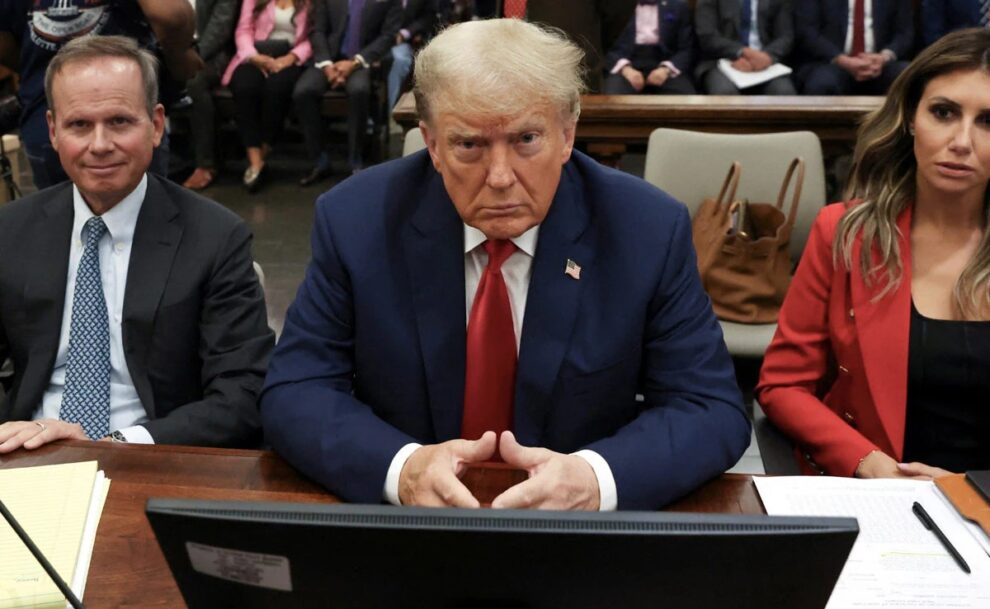Donald Trump’s alleged blabbing of the details of U.S. nuclear submarines to an Australian billionaire – who then shared it with scores more people – didn’t make the list of charges special counsel Jack Smith detailed in his June indictment of Trump on mishandling classified materials.
But if Trump indeed shared the highly sensitive information, as ABC News first reported, the consequences are very serious, and not only if Trump is elected president again next fall, experts say.
The details themselves could compromise the deterrent power of nuclear submarines, say people familiar with the military boats, since the unknown specifics of how many nuclear warheads are aboard is crucial to the strategic value of the vessels when they are at sea.
But perhaps even more damaging, they say, is that America’s reliability as a confidential partner has taken a big hit – even though Trump is no longer in office.
“Other countries will share less with the United States when they think that over time, an administration may leak – on purpose, by accident, and even when they’re out of office,” says national security specialist Christopher Nichols, a professor at The Ohio State University, where he is the Wayne Woodrow Hayes Chair in National Security Studies.
“Do you tell your secrets to the kid who leaks it all? No, and if it happens serially, you stop,” Nichols adds. “If our best allies in the world are becoming more circumspect about what they can share, just imagine what that means for wavering allies” – all of whom could provide potentially critical information to the United States on terrorist and other threats, he says.
Trump – whose spokesman said “did nothing wrong” when contacted by ABC, which broke the story Thursday night – has a history of being incautious with sensitive information, he notes.
Early in his presidency, Trump revealed classified information to Russian government officials while they were in the Oval Office with him, according to numerous press reports quoting current and former U.S. government officials.
Also during his presidency, Trump put a classified satellite image of an Iranian launch site on social media (the image was declassified years afterward). And Smith’s indictment on the classified documents case includes details of how Trump, at his Bedminster, N.J. golf resort, waved around a classified battle plan to attack Iraq. The indictment said there is a recording of Trump himself declaring it “secret” to visitors at Bedminster.
The details Trump allegedly shared about the subs themselves had to do with exactly how many nuclear warheads they typically carry, and how close they can get to a Russian submarine without being detected, ABC reported. That may sound relatively unimportant – especially since Australia is an ally — but it could be a life-and-death matter for seamen on the boats, experts say.
“I used to ride around” on the subs, says Robert Sanders, a retired Navy JAG captain and private industry military communications and weapons systems engineer. While foreign governments may have a “vague idea” of how many warheads the boats carry, “each missile in that tube is [engineered] so you don’t know how many warheads are at the top of that tube,” adds Sanders, who is a professor of national security at the University of New Haven.
“The specifics matter – it gives you a sense of what you could target,” and having that information would make it easier for an enemy nation to successfully destroy a U.S. submarine, Nichols says. “Some might say some of this is public, but if the president confirms it, it is a known truth with a capital ‘T’.”
There are definitely a great number of documents that should not be classified, experts agree. But “some things should be legitimately classified, and this is one of them,” Nichols says.
Joe Cirincione, a national security expert and author formerly with the United States Information Center, said the number of people who have the information Trump reportedly shared is “in the 100s.”
“This is some of the most highly classified information in the system,” Cirincione said in an interview on MSNBC Friday. “If I had done this, I would be in jail right now. You wouldn’t be hearing from me for a long time,” he added. Trump has “loose lips that sink Navy ships,” Cirincione said.
Republican candidates for the presidential nomination have been quiet about the most recent allegations against Trump, with the exception of former New Jersey Gov. Chris Christie, the former president’s most vocal critic in the Republican field.
“He wants to show off. He wants to make himself seem important. It’s not enough for him to have been the former president of the United States,” Christie said in an interview on CNN Friday.
“He wasn’t trying to do anything nefarious,” Christie said, but “he can’t shut up. He can’t help himself. He’s never been able to keep a secret.”
Trump does not get intelligence briefings, a courtesy typically extended to former presidents. Early in his presidency, Joe Biden said Trump’s “erratic behavior” should prevent him from getting access to the sensitive information.
“I just think that there is no need for him to have the intelligence briefings,” Biden said in an interview with CBS in 2021.
“What value is giving him an intelligence briefing? What impact does he have at all, other than the fact he might slip and say something?” the president added.
Source: U.S.News















